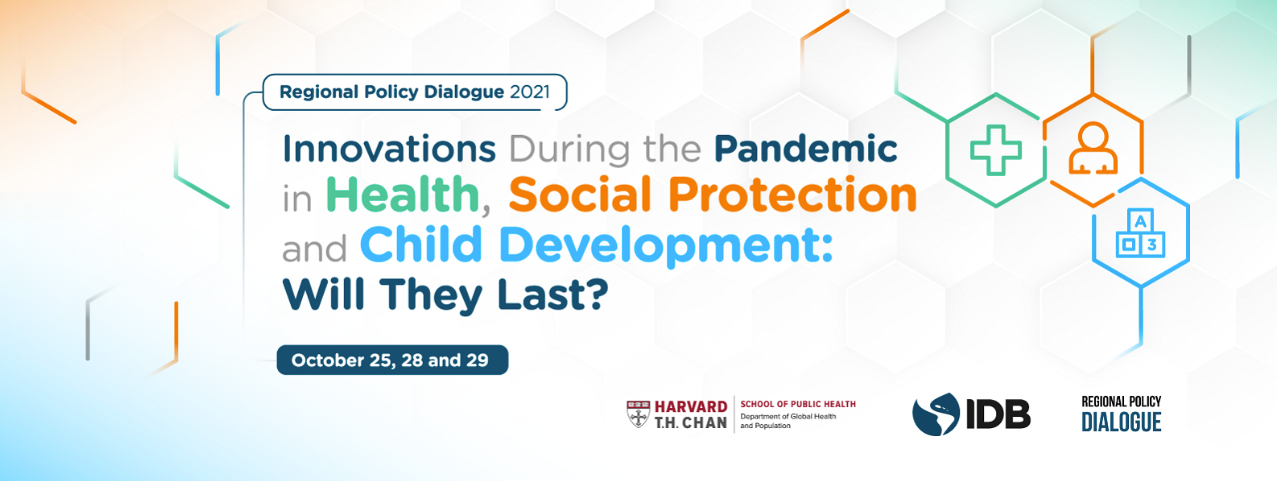When representatives from Latin America and the Caribbean get together for a dialogue around the present and future of areas as important as health, social protection, and early childhood development, the result is an unending stream of ideas, exchanges, and synergies. Paths open; paths which, beyond showing the shared needs and shortcomings, lead to lessons and innovations that may be adapted to each context.
During three days on late October, 2021, more than 80 people, authorities and representatives from the entire region, gathered virtually with international experts and from the Inter-American Development Bank. On this Regional Policy Dialogue we explored what innovations were developed due to the COVID-19 pandemic, which will endure, and how they can strengthen the provision of social and health services to render them more cost-effective, equitable, and resilient in the future.
We will publish a series of articles which address the most important themes discussed in this dialogue and which gather the main lessons derived in the Primeros Pasos and Gente Saludable blogs. In this first installment, we would like to highlight three relevant issues to mitigate the pandemic’s negative impacts on children and their caregivers and strengthen the region’s long-term agenda around early childhood.
1. Leverage the opportunity we are afforded by early childhood to address both the children and their caregiver
Unless we pay much attention to the first stage of life, the first thousand days, and the following thousand days, we will miss the chance to prevent health, learning, and development problems in adult life. This is related both to the child and to his or her family and community, those in charge of providing care and attention.
This was one of the priorities which stood out in the discussions. The emphasis was not only on the attention to small children, but on how to provide the families with support to promote a stimulating environment for the child –one rich in warm interaction, game and language, emotionally stable and violence-free. Therefore, interventions to promote mental health and physical and emotional wellbeing in the family and of caregivers from outside the family environment were identified as a priority to guarantee the child’s wellbeing.
2. Retain the talent we train to care for the little ones
We must find ways to make the human resources –facilitators, educators, teachers; primarily women and with relatively precarious working conditions– feel recognized and valued so as to ensure that the best talent stays within the community. Reducing rotation is critical because all investment in training should be leveraged and because these are the people who better know the children and their families.
Policy design should ensure that they have all the tools required for their jobs: material, resources, and adequate training and support, which allow them to develop professionally. The secret is to empower them and strengthen their abilities and talents, giving them all the content, socio-emotional, and digital skills either through digital or hybrid channels or through safe face-to-face interactions. Strengthening the institutions that care for them is also a priority. During the last 18 months, we have seen the enormous burden borne by frontline workers, whether community agents, caregivers or teachers; hence, caring for their mental health and guaranteeing their safety while performing their roles is also part of the answer for the region’s recovery.
3. Guaranteeing coverage with quality services households in remote, rural and disconnected areas
We should take the lessons learned around the multiple tools that have been tried and used during the pandemic to maximize the potential of hybrid modalities and other innovations.
In this line, what’s most important is to identify which technologies and channels are pertinent in each context. In some, cell phones and WhatsApp can be useful; in other contexts, we might have to look for alternatives such as desktop computers in community centers, bulletin boards in strategic community spots, or television channels and local radio.
Although technology is important and can help us close coverage gaps, we should not forget that face-to-face interactions are irreplaceable. Certainly, we must find the way for this in-person contact –in care centers, home visits, or group encounters– to be done safely and assess the possibility of complementing it with all the innovations in remote care modalities brought on by the pandemic.
The common denominator in all these processes is the flexibility, creativity, and the ability to adapt of early childhood care services. We must show the program managers and political leaders the evidence on innovative ideas to decide on the caregivers’ support, training, mental health, and wellbeing. With this in mind, we will keep up our tracking, monitoring, and evaluation efforts to keep learning and promoting interchanges of ideas such as this one to help us build a new roadmap of what quality service provision in scale should look like.
What are the lessons you have learned working with small children? Please share with us in the comment section below and return to this blog to read the next installments in this article series on Lessons from a Regional Dialogue for Early Childhood.


Leave a Reply